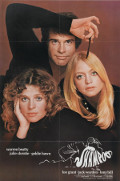
Directed by
Hal Ashby
109 minutes
Rated MA
Reviewed by
Bernard Hemingway

Shampoo
Hal Ashby's film is a kind of cinematic book-end to the Swingin' Sixties as ushered onto the big screen by The Graduate in 1967, a year before Shampoo is set (if that is a pun it is unintended). 1968 is also the year that Robert Towne began writing his screenplay for which he shares writing credit with star and co-producer Warren Beatty (Paul "Mrs Robinson" Simon provides the original songs here).
Beatty stars as George, a bed-hoppin’ Beverley Hills hair-stylist, George Roundy (a character modelled on the real life celebrity hairdresser, Jon Peters), whose inability to resist the many sexually-willing (here principally played by Lee Grant, Goldie Hawn and Julie Christie with a smaller contribution from Carrie Fisher) his job brings him into contact with leads him to make a hash of his personal relationships and his business ambitions, This essentially comedic material is well-balanced by the knowing screenplay in which George the irresponsible hedonist who loses his girl to a wealthy businessman (Jack Warden) serves as a kind of metaphor for the youthful ideals of the free love Sixties swallowed up by big business and socio-political conservatism, a resemblance brought home by the backdrop of the victorious 1968 Nixon/Agnew Presidential campaign.
Although the comedy is more consistently mildly amusing than laugh-out-loud funny, Beatty is engaging in the lead as the rock-star hairdresser, the actor playing a character who is considerably less intelligent than clearly Beatty is himself (on the other hand, Beatty's real-life conquests are legendary).
The film was a hit in its day but this probably had more to do with Beatty’s star-power (which merged with his reputation as an off-screen Lothario) and the fact that like The Graduate but much more frankly it dealt with the Zeitgeist hot button topics of promiscuity and permissiveness. Lee Grant picked up a Best Supporting Actress for her effort but it is Julie Christie (who was having a fling with Beatty at the time) who shines. It was obligatory in movies dealing with the peace and love era to have a party scene where all the freaky people could be displayed (a penchant parodied in Peter Sellers’ The Party, 1968) and this has one of the best I can recall after Midnight Cowboy (1969). The excellent choice of contemporary pop music is presumably due to Phil Ramone, who is credited as music advisor.
The Zietgeist has moved on and the film's political references will probably be lost on younger audiences but Shampoo remains an entertaining film and an undervalued one as well as being one of the handful of exceptionally strong films Hal Ashby made during the '70s.
Want something different?





